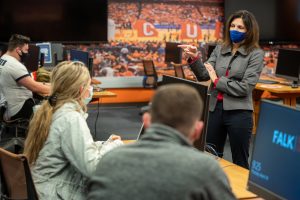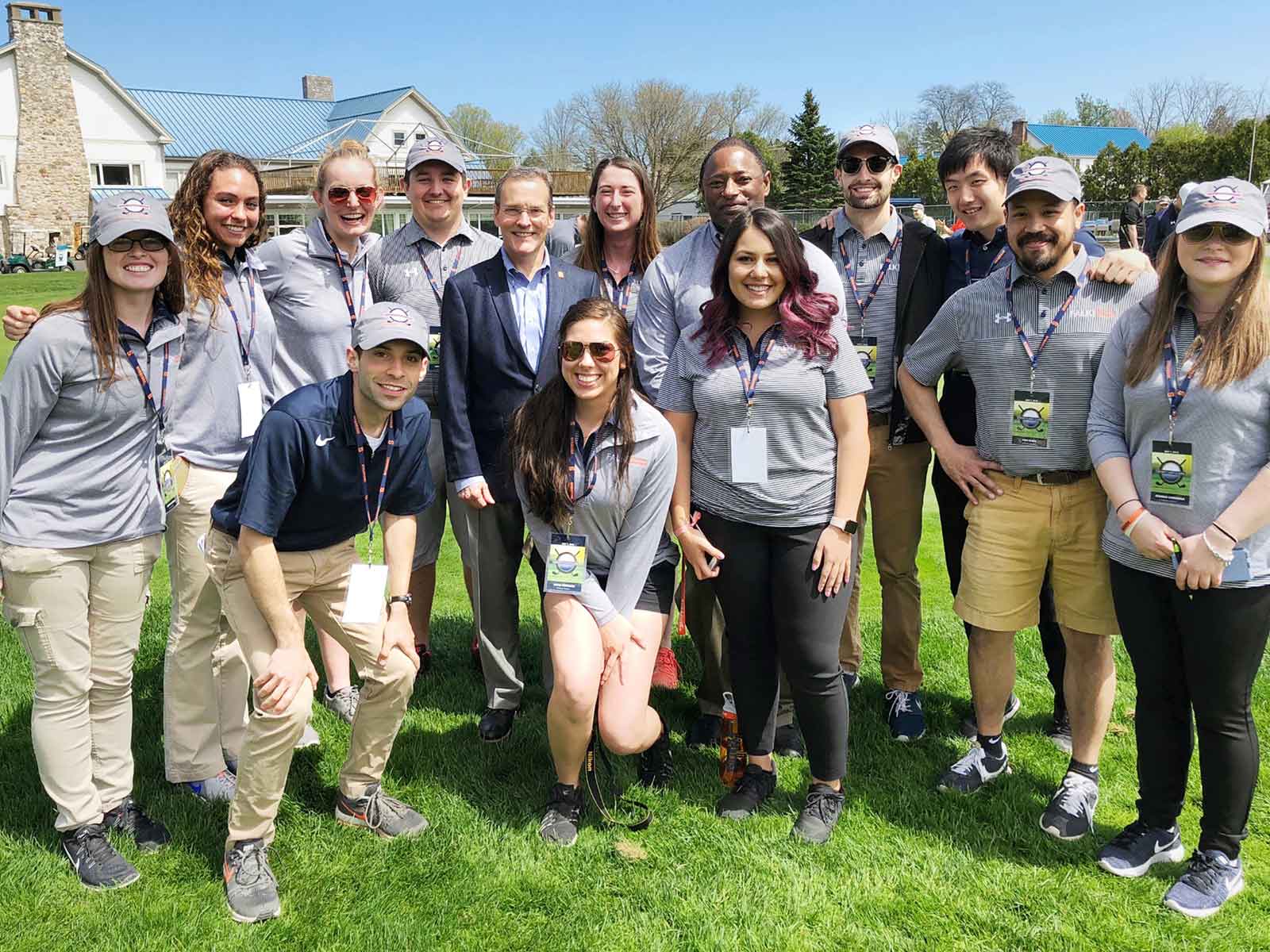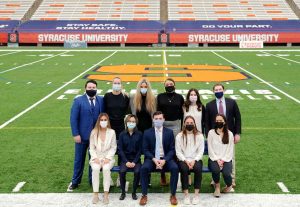Some years ago, Gina Pauline saw an announcement for an upcoming half-Ironman—the famously challenging triathlon. She’d never done much bike riding, and the competition was just three months away, but she decided to give it a try. On the day of the race, temperatures dropped into the 40s. Undeterred, Pauline plunged into the lake and swam more than a mile. Then, despite the hypothermic conditions and lingering scrapes from a recent fall, she climbed on her bike and rode 56 miles before finishing with a 13-mile run. “I loved it,” she says with a laugh. Endurance races are now a regular feature of her life.

There are striking similarities between Pauline’s introduction to Ironman competitions and her early career. Pauline, who is now an associate professor and the undergraduate director in the Department of Sport Management in Syracuse University’s Falk College, tells students about her start in the sport management industry in hopes they’ll gain insight and encouragement from her experience. Her first professional role was as an intern with the Eastern College Athletic Conference. “I was assigned to Division I men’s ice hockey—Brown, Cornell, Princeton—those teams. My job included putting together their media guides, selecting the players of the week, doing press releases.” At the time, she knew very little about ice hockey. “I’d never even seen a game,” she admits. The challenges she faced in her new position were compounded by the fact that she was just 20 years old and one of very few women in a professional environment dominated almost entirely by men with decades of experience.
Determination, Passion and Grit
But she dove in, she says, learning as much as she could by watching games and studying the sport. “Somehow, I figured it out. I just kept going with it—showing up early and staying late and doing my best,” she explains. “And when I had a setback, I didn’t let it define me.”
Pauline’s resolve paid off, and she was rewarded with another 12 championship assignments, including in soccer, volleyball and a major swimming and diving event. It was an exhilarating experience that confirmed her passion for the field. “I loved the events. I loved the planning. I loved watching the athletes perform and being able to give them a great experience.”
Passion—a true love for the tremendous amount of creativity and management that make sporting events possible—is an essential component for those interested in going into the industry, Pauline says. As long as that’s there to sustain them during the periods of intense work and pressure, then the other qualities required to thrive are ones that can be honed. She encourages students to be willing to step up to new experiences, adapt nimbly and foster resilience in the face of challenges.

Transforming the Field
Pauline brought that spirit of commitment and enthusiasm when she and her husband, Jeff Pauline (now an associate professor of sport management specializing in sport psychology) joined Syracuse University in 2006, drawn by the unique opportunity to help develop the nascent program. Since then, Syracuse’s sport management department has become one of the most competitive in the country.
Pauline is particularly proud of the work they’re doing to address gender imbalance in the sport management industry. She served as advisor to the first collegiate chapter of Women in Sports and Events (WISE), a national networking and professional development organization. “It’s a signature part of our department now,” Pauline says. “WISE gives us the framework to bring our phenomenal female students together to work on meaningful events and to have the mentorship to really empower them toward professions in the industry.”
Pauline’s eyes were opened to sport management as a career path by a fortuitous internship in the athletics department of Binghamton University, where she earned her bachelor’s degree in psychology and competed on the women’s swim team. Now one of her missions is to raise awareness of the field. She has developed an introductory sport management course for Syracuse University Project Advance, which offers college courses to high school students. Working with high schools also affords her the opportunity to challenge the enduring misconception that sport management is an industry primarily for men, she says.
Adapting and Thinking Creatively
One of the responsibilities Pauline enjoys most is a graduate course she teaches every spring. The students, who are pursuing master’s degrees in sport venue and event management, are tasked with planning an event from start to finish. “They start with a budget of zero. They have to conceive an event, determine the logistics, branding, marketing, and sell sponsorships,” Pauline explains. All proceeds go to charitable causes, which, Pauline says, provides an important lesson in the value of giving back to the community. “To watch them go through the work and then watch the final product and their recognition that they’ve just raised $20,000 for a cause they believe in—that’s very rewarding,” she says.

The 2020 cohort was in the midst of organizing a dinner, silent auction and golf tournament centered around their classmate and Syracuse basketball player Tiana Mangakahia ’19, G’21, who recently overcame breast cancer, when the COVID-19 pandemic interrupted plans. “The students had everything planned and ready to go,” Pauline says. “ESPN reporter Holly Rowe, who’s also a three-time cancer survivor, was going to come and speak. Several local celebrities were scheduled to attend, sponsorships were secured, and the event was essentially sold out two months in advance.” Proceeds were slated to go to Crouse Breast Health Care Center at Crouse Hospital, where Mangakahia had received her testing and diagnoses.
The students adapted the materials so the event—the SVEM Pink Ribbon Classic—can proceed at a later time. Meanwhile, they have adjusted to the pandemic in other ways, too. This year’s cohort has organized a virtual symposium and speaker series on topics related to the mental health of student-athletes, which will bring together students, coaches and administrators from around the country.
The pandemic has indeed been an unexpected challenge, Pauline says, but it has also provided an opportunity for students to practice the adaptability, creative thinking and resourcefulness that ensure they will flourish in their field.
~ A Syracuse University story by Sarah H. Griffin published on March 24, 2021.
